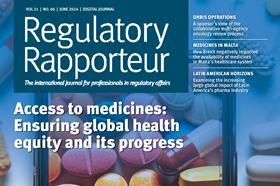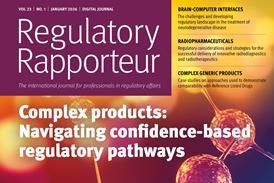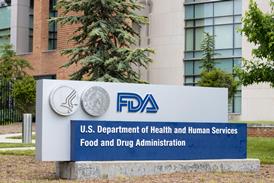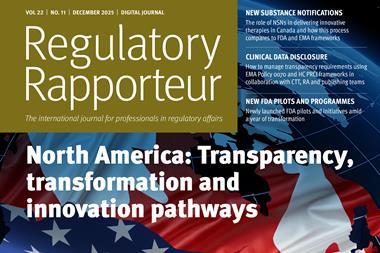
Regulatory Rapporteur
June 2024 | Volume 21 | No.6
The World Health Organization (WHO) has estimated that one-third of the global population lacks regular access to essential medicines. The concept of access to medicines will likely resonate differently within the various regulatory speciality areas, however there are ultimately five common factors that include availability, affordability, accessibility, acceptability and quality.
For many regulatory affairs professionals, the term ‘access to medicine’ is synonymous with global equity and provision of medicines within under-developed or developing countries and regions. Indeed, there are already many initiatives underway to enhance access. For example, multiple non-profit organisations are championing access from the pharmaceutical company perspective:
- Accumulus Synergy is a healthcare-technology company that is working with multiple global pharmaceutical companies to increase efficiencies in the approval process. In Q1 of 2024, it launched the initial version of its reliance information and data exchange platform.
- The Campaign for Access to Essential Medicines was set up by the Médecins Sans Frontières (MSF) in response to the need for better treatments, vaccines and diagnostic tests.
- The Access to Medicine Foundation stimulates and guides pharmaceutical companies to do more for people living in low- and middle-income countries.
- Medicines360 is focused on developing products that enable more access for women and its subsidiary, Curae Pharma360 Inc, is improving availability of quality generic drugs and other medicines that are in short supply.

From an agency perspective, there have been a number of recent publications and advancements regarding access. The Accelerating Clinical Trials in the EU (ACT EU) initiative represents a concerted effort which involves the European Medicines Agency (EMA), the Heads of Medicines Agencies (HMA) and the European Commission (EC) to streamline and improve the clinical trials landscape across the European Union (EU). Key objectives include enhancing efficiency by streamlining initiation and approvals processes for clinical trials in order to reduce delays and administrative burdens. Improved collaboration and harmonisation to facilitate smoother multinational trials are all essential objectives to enhance access to clinical trials and ultimately novel products.
The European medicines regulatory network has been designated as a WHO-listed authority (WLA) by the WHO. This network, composed of the EC, EMA and the 30 national authorities of the European Economic Area member states (MS), is now recognised as meeting international regulatory standards, guidelines and practices. The WLA initiative aims to promote access to, and supply of safe, effective and high quality medical products by ensuring optimal use of limited global regulatory resources. The work and decisions of trusted regulatory authorities can be used as a reference point by regulatory authorities that lack the resources to perform all necessary regulatory functions, or which have not yet reached higher maturity levels for medical product oversight.
Furthermore, the International Council for Harmonisation of Technical Requirements for Pharmaceuticals for Human Use (ICH) Assembly recently approved Argentina’s National Administration of Drugs, Food and Medical Devices (ANMAT) and Jordan’s Food and Drug Administration (JFDA) as new members. This has brought the ICH to a total of 23 members and reinforces its drive towards a harmonised regulatory affairs landscape with global standards.
The International Federation of Pharmaceutical Manufacturers and Associations (IFPMA) and the Latin America Federation for the Pharmaceutical Industry (FIFARMA) conducted a webinar in May 2024 to discuss practical experiences, tools and case studies that represent innovative approaches to regulatory reliance and reflect on how these learnings could be applied in Latin America and the Caribbean. Reliance was perceived as a key tool to promote stronger regulatory systems.
Within our June focus articles, Miguel Manuel Lewis looks to the opportunities and challenges in the Latin American pharmaceutical industry. Despite variations in regulatory systems across the region, concerted efforts have been made to fortify regulatory frameworks, establish quality review mechanisms and adopt risk-based approaches. Through these collective efforts, regulatory agencies and pharmaceutical enterprises can more adeptly navigate regulatory hurdles, ultimately advancing the wellbeing of patients and public health outcomes throughout the Latin American region.
With accessibility and availability in mind, Project Orbis provides a framework for the concurrent submission and review of regulatory dossiers, with member agencies in the project, and has the goal of providing faster patient access to innovative cancer therapies within areas of high unmet medical need across its participating countries. The Oncology Regulatory Science, Strategy and Excellence team from AstraZeneca discuss Project Orbis from a sponsor’s perspective, looking at the collaborative international review process and opportunities for the future.
Many of the same countries are also involved in the Access Consortium (Australia, Canada, Singapore, Switzerland and UK) and they have also established the Promise Pilot Pathway as an aligned process for priority review (PR)/fast-track of new active substance applications. Significantly, one PR request package is submitted to all participating agencies within Access, with a ‘lead’ agency chosen to assess. If consensus is not reached, the applicant can choose to submit via the Promise pathway to the agencies that accepted the request or submit via standard Access review procedure to all agencies.
Switching focus article topics to the angle of affordability and accessibility, we expand on our 2023 Health Technology Assessment (HTA) Access article with an update on the rapidly evolving HTA Regulation from Rosa Willock, Sophia McGovern, and Sarah Cocklin from Decisive Consulting Ltd.
Yvette Patrocinio analyses the availability of medicines post-Brexit in Malta and details that 542 marketing authorisations (MA) with a UK-based MA holder were withdrawn in Malta post-Brexit. A total of 544 MAs became invalidated because, as UK MAs, they no longer met EU legislative requirements. This article highlights that poor availability of medicines has a clear negative downside on economic, clinical and human levels which are especially relevant to EU MS such as Malta, with smaller pharmaceutical markets where lack of availability of medicines is a problem.

We continue the Brexit theme with Mika Reinikainen’s article on the newly created profession of UK Responsible Person (UKRP). As part of a Regulatory Rapporteur series, this article spotlights the UKRP Association (UKRPA), and details how the UKRPA intends to facilitate this role by ensuring good communications with the competent authority, the UK’s Medicines and Healthcare products Regulatory Agency (MHRA) and providing relevant resources to its members.
Two years into the new Veterinary Medicines Regulation (2019/6) for the EU, Rick Clayton analyses the implementation status of the new rules which required four substantial areas of work. Ultimately the measures being implemented also aid accessibility in terms of streamlining and updating processes and enhancing data transparency, and hopefully accelerate the development of novel therapies within the veterinary sphere.
Finally, April Wang provides the latest piece in her series of articles looking at China and focuses on comparing the drug master file (DMF) with the EU and US. It explores seven key perspectives of registration pathways, product scope, confidentiality, timeline and cost, submission format, approval status, renewal cycle and post-marketing responsibilities. By highlighting both differences and similarities, it equips international pharmaceutical companies and regulatory professionals with insights to navigate China DMF registration process effectively within a global context.
Ensuring that everyone, regardless of their socioeconomic status, has access to essential medicines (whether pharmaceutical, device or veterinary) is not only a moral imperative but also a critical component to achieve global health equity. To succeed we must address a number of barriers such as regulatory issues and non-harmonisation, supply chain challenges and healthcare infrastructure limitations. This focus edition has highlighted a number of these challenges, but hopefully has also given you a flavour for the significant advances which are being made regarding access.































